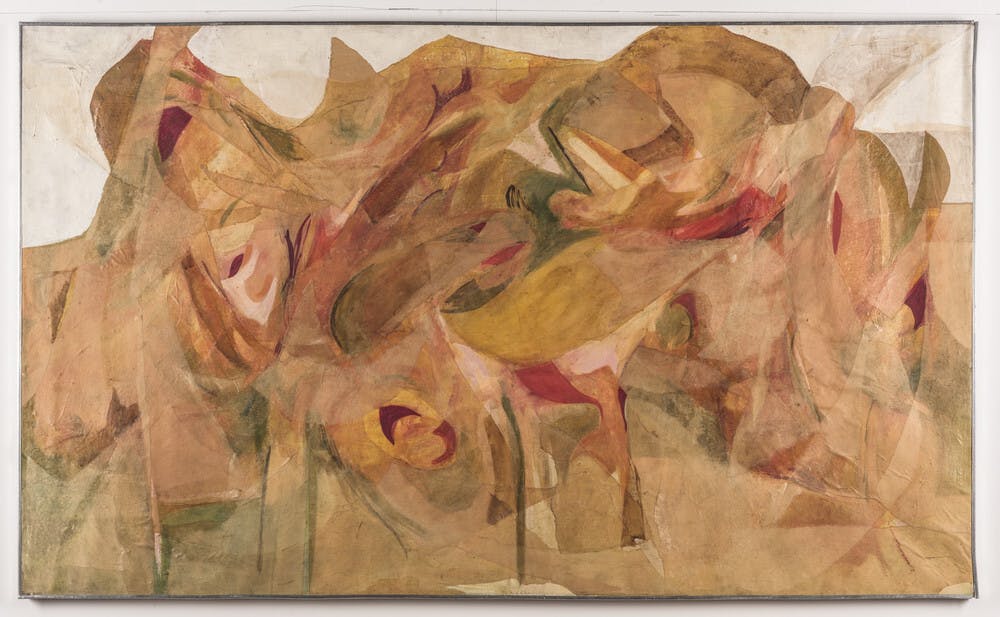Betty Blayton-Taylor
(1937–2016)A deeply creative and committed artist and activist, Betty Blayton-Taylor was an influential arts leader in the Harlem art scene—and New York at large.
Biography
Betty Blayton-Taylor was a groundbreaking leader who devoted her life to creating space for artists, art, and arts education. She grew up in Williamsburg, Virginia, and declared her desire to be an artist at age four. She was unable to pursue an arts education in her home state due to segregation, but Virginia did offer funding for Black students to pursue degrees in other states—an opportunity Blayton took up to attend Syracuse University in New York. Following her graduation, she spent time in Washington, DC, where she socialized with members of the Washington Color School, such as Sam Gilliam. She soon took a teaching job in St. Thomas, Virgin Islands. There, her painting practice was deeply influenced not only by her time in Washington but also by the new landscapes that surrounded her. She relocated to New York City in 1960. While her practice still employed figuration, she shifted toward abstraction. Blayton-Taylor believed in the power of abstraction to depict the Black experience and, in the following years, pioneered an approach that combined elements of abstract expressionism and Color Field painting.
Beyond her art practice, Blayton-Taylor played a critical role in Harlem and New York art and activism in support of arts education. She cofounded the Studio Museum, and went on to serve on the institution’s Board from 1965 to 1977. She held additional roles at the Children’s Art Carnival in Harlem (1968–98); Board of Education of the City of New York (1968–94); and Arts & Business Council of New York City (1975–96). She also served on the Board of the Robert Blackburn Printmaking Workshop (1978–98).
Blayton-Taylor earned her BFA from Syracuse University. She received awards such as the Eugene Grigsby Award for Excellent Contributions in Art Education from the National Arts Education Association (1990); and the Lifetime Achievement Award from the Women’s Caucus for the Arts (2005). The Studio Museum has presented her work in Tonnie Jones' Sculptures and Betty Blayton Taylor's Oil Collages: Etchings and Small Sculptures (1974) and Selections From the Permanent Collection (1980).
Betty Blayton-Taylor
(1937–2016)A deeply creative and committed artist and activist, Betty Blayton-Taylor was an influential arts leader in the Harlem art scene—and New York at large.
Untitled, 1968
Biography
Betty Blayton-Taylor was a groundbreaking leader who devoted her life to creating space for artists, art, and arts education. She grew up in Williamsburg, Virginia, and declared her desire to be an artist at age four. She was unable to pursue an arts education in her home state due to segregation, but Virginia did offer funding for Black students to pursue degrees in other states—an opportunity Blayton took up to attend Syracuse University in New York. Following her graduation, she spent time in Washington, DC, where she socialized with members of the Washington Color School, such as Sam Gilliam. She soon took a teaching job in St. Thomas, Virgin Islands. There, her painting practice was deeply influenced not only by her time in Washington but also by the new landscapes that surrounded her. She relocated to New York City in 1960. While her practice still employed figuration, she shifted toward abstraction. Blayton-Taylor believed in the power of abstraction to depict the Black experience and, in the following years, pioneered an approach that combined elements of abstract expressionism and Color Field painting.
Beyond her art practice, Blayton-Taylor played a critical role in Harlem and New York art and activism in support of arts education. She cofounded the Studio Museum, and went on to serve on the institution’s Board from 1965 to 1977. She held additional roles at the Children’s Art Carnival in Harlem (1968–98); Board of Education of the City of New York (1968–94); and Arts & Business Council of New York City (1975–96). She also served on the Board of the Robert Blackburn Printmaking Workshop (1978–98).
Blayton-Taylor earned her BFA from Syracuse University. She received awards such as the Eugene Grigsby Award for Excellent Contributions in Art Education from the National Arts Education Association (1990); and the Lifetime Achievement Award from the Women’s Caucus for the Arts (2005). The Studio Museum has presented her work in Tonnie Jones' Sculptures and Betty Blayton Taylor's Oil Collages: Etchings and Small Sculptures (1974) and Selections From the Permanent Collection (1980).
